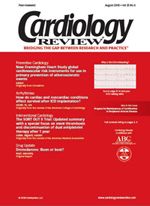Publication
Article
Cardiology Review® Online
The vegetarian paradox: Low HDL cholesterol levels and low cardiovascular risk
Author(s):
Ever since the observation in the 1950s that high-density lipoprotein (HDL) cholesterol was inversely correlated with coronary artery disease, there have been confounding data that have not been reconciled.
Ever since the observation in the 1950s that high-density lipoprotein (HDL) cholesterol was inversely correlated with coronary artery disease, there have been confounding data that have not been reconciled. Studies comparing populations, rather than assessing intra-population data, show that higher HDL cholesterol levels are found in countries where vascular disease is more prevalent. Populations that stick to a vegetarian diet have lower HDL cholesterol levels than those that consume meat and butterfat.
It is well-established that switching to a more heart-healthy diet reduces low-density lipoprotein (LDL) cholesterol levels and is often associated with HDL cholesterol reduction. This is sometimes an issue of great consternation for our patients, especially those with low HDL cholesterol levels or those who have read the latest article on HDL cholesterol in the popular press. In such cases, we offer reassurance that low HDL cholesterol in the setting of very low LDL cholesterol does not matter or, at the very least, is less important. Otherwise, why not encourage them to eat fatty foods to raise their HDL cholesterol levels?
In their study, deGoma and colleagues inadvertently supplied much needed data on this topic. Their objective was to study the relationship between HDL cholesterol levels and cardiovascular risk in a well-treated Veterans Administration population with LDL levels < 60 mg/dL. Even in this patient cohort, HDL levels correlate with risk; however, the lowest HDL cholesterol quartile (28 mg/dL) demonstrated only a 13% increased risk of cardiovascular events compared with the higher HDL cholesterol quartile (63 mg/dL), which had the least risk. HDL cholesterol levels and overall mortality demonstrated a U-shaped curve relationship; the 63-mg/dL HDL cholesterol quartile had an all-cause mortality rate equal to that of the 28-mg/dL HDL cholesterol quartile. Even omitting the highest HDL cholesterol quartile, HDL was just not as potent a risk modifier in this study. Although the highest HDL cholesterol quartile had a greater risk than the third quartile (43 mg/dL), it also showed a statistically significant increase in alcohol intake (26% vs. 11%, respectively). This is likely to have played some role in the increased HDL cholesterol levels and greater total mortality observed in these patients. Physicians who suggest alcohol as a means to raise HDL cholesterol levels should note this finding.
The authors correctly conclude that HDL cholesterol levels predict cardiovascular event risk, even in patients with low LDL cholesterol levels. However, compared with previously published data that suggest a 25% decrease in cardiovascular risk for every 10 mg/dL increase in HDL cholesterol, the data from this study show that HDL cholesterol levels in patients with low LDL cholesterol levels is a much less potent risk modifier (only a 13% reduction in cardiovascular event risk for every 15 mg/dL increase in HDL cholesterol). Lowering LDL cholesterol appears to be prudent in patients with low HDL cholesterol levels.






